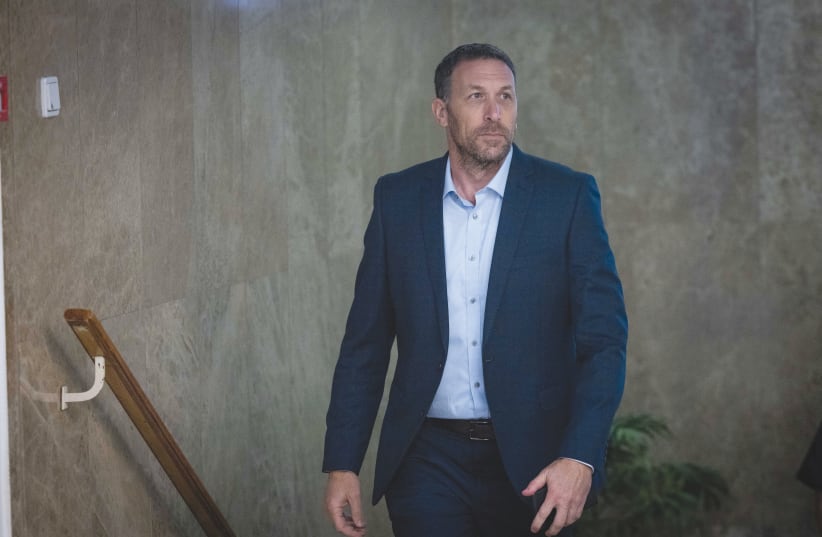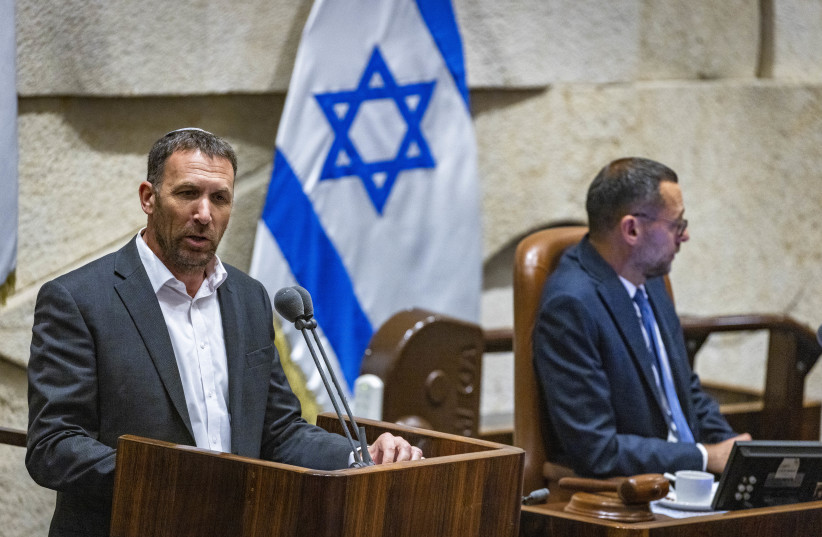The Internet headlines painted a nasty picture:
“MK Kahana: ‘If there was a button to send the Arabs to Switzerland – I would push it,” read one in Hebrew.
“Israel MP says he wishes there was a button to get rid of Palestinian citizens,” read another in English.
And, indeed, the headlines reflected a part – a very ugly part – of what Kahana said during a speech earlier this week to students in Efrat.
“If there was a button you could press that would make all the Arabs here disappear, and would send them on an express train to Switzerland where they would live tremendous, tremendous lives – I wish them all the best in the world in Switzerland – I would press that button,” he said toward the end of a 2:32 minute clip Kan posted on its Twitter feed.
But these headlines did not reflect the other half of what he said, which is that since this is obviously impossible, Jews and Arabs are destined to live here together and need to figure out how to coexist.
“But what can you do?” he continued. “There is no such button to transfer all the Arabs to Switzerland. Therefore, apparently, we were destined to exist here [together] on this land in some form.”
The criticism
This is where the clip ends. Kahana, who came under withering criticism – not unjustifiably – for the first part of his comments, tweeted a Facebook link he posted about a month ago that was very similar to the speech he gave in Efrat. There he concluded the thought cut short in the clip shared on Tuesday: that Ra’am head Mansour Abbas is a courageous leader, and that a coalition that includes an Arab party is the way toward coexistence.
“If there were a button you could press that would make all the Arabs here disappear, and would send them on an express train to Switzerland where they would live tremendous, tremendous lives -- I wish them all the best in the world in Switzerland -- I would press that button.”
Yamina MK Matan Kahana
Joint List MK Aida Touma-Suleiman jumped on the first part of Kahana’s comments, and said – in an allusion to his last name, which is similar to Rabbi Meir Kahane who openly advocated the transfer of Arabs from Israel – that the “Kahanist apple doesn’t fall far from the tree.”
That is hyperbole. Kahana is not a Kahanist. He was not advocating putting Arabs on trains and shipping them to Switzerland. Rather, he was articulating what many people – Jews and Arabs – believe in the recesses of their hearts as a result of a bloody conflict spanning 160 years: it would be so much easier were the other side simply not here.
But Kahana ascribes to the realistic position that understands it is not going to happen: that the other side is here to stay, and as a result, both sides will have to find a way to coexist. His was a very poor articulation of a mantra mouthed often by the center and the Left to much less criticism: Israel and the Palestinians are destined to live together. The subtext of that comment is that this is not something they necessarily want to do, but rather are fated to do.
None of this is meant to excuse Kahana’s choice of words, for which he later apologized. Not every idea in the recesses of one’s heart need be expressed, especially ones that are offensive – and his words are offensive. Just as Jews would find it offensive for an Arab MK to say he wished the Jews would disappear, so too is it offensive for a Jew to say the same of Arabs.
But the full context of what he said needs to be brought out as well, which is: since no one is going anywhere, the current coalition – which includes the Ra’am (United Arab List) Party – is a courageous step toward coexistence.
That part of his speech was cut from the 152-second clip that became public on Tuesday. To fill in the gap, Kahana tweeted his Facebook post from last month.
In that post, he made clear that in reality, nobody here is going anywhere: “Not the Arab citizens of Israel, not those who live in Judea and Samaria, and definitely not us. Apparently, we are destined to live together somehow on this piece of land between the river and the sea.”
As a result, he continued, a way needs to be found to manage within this conflict, since it is not at all certain that it can be resolved – certainly not right now.”
Explaining the rationale for forming a government with Ra’am, he wrote: “Within the midst of all this chaos, an Israeli Arab-Muslim leader recently emerged who apparently understands the same thing. He realized there would be no peace, certainly not now, and he realized that no one was going anywhere.
“And amidst all the chaos,” he said about Abbas, “he said to his public, to Israeli-Arab citizens, that perhaps it is worth trying something different. He tells them that being citizens of a Western and democratic state may be a great opportunity; an opportunity that none of their brethren have in the Arab Muslim world. And maybe, when things look a little different, they will have better schools, and better infrastructure, and maybe crime will go down, and the chances of being hit by a stray bullet fired in a crime family war will be much lower.
“And this leader decided to be part of the coalition and try to do things differently. And even if we look only from the point of view of the Jews, this is something good. This is something we want. This is something we should welcome because we, too, know that changes come from within.”
There are a couple of lessons that can be learned from this whole brouhaha.
The first, the most obvious one, is that public figures must always be careful how they speak.
In 2013, the head of Kahana’s Yamina party, Prime Minister Naftali Bennett, triggered a similar storm when during a speech to the Yesha Council as minister of economy and religious services, he likened the Palestinians to a piece of shrapnel stuck in the buttocks.
“I’ll tell you a quick story,” Bennett said. “I have a friend called Yoav. He served in the IDF Golani Brigade, and in a clash, shrapnel got stuck in his butt. I came to visit him in the hospital, and he told me, ‘Look, I have this shrapnel... According to the doctors, I have two options: either to have an operation to remove the shrapnel, running the risk of becoming handicapped, crippled for life, or to leave it there, although from time to time, at the change of seasons, it may hurt a bit.’ So, he decided to continue living with it... There are situations where deceptive striving for perfection is liable to cause a disaster.”
Bennett was slammed for that comment, and it is one that often appeared in profiles about him when he took over as prime minister last year. Kahana, a close political ally and friend of Bennett’s, should have learned from that experience.
And the other lesson, this time to the news consumer, is to look at the entire context of outlandish statements. Sometimes that context can shed a bit of a different light on what was said.
Not always, but sometimes.

